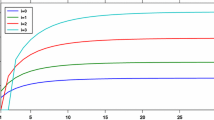Abstract
Based on an extension of the controlled Markov set-chain model by Kurano et al. (in J Appl Prob 35:293–302, 1998) into competitive two-player game setting, we provide a model of perfect information two-person zero-sum Markov games with imprecise transition probabilities. We define an equilibrium value for the games formulated with the model in terms of a partial order and then establish the existence of an equilibrium policy pair that achieves the equilibrium value. We further analyze finite-approximation error bounds obtained from a value iteration-type algorithm and discuss some applications of the model.
Similar content being viewed by others
References
Altman E, Feinberg EA, Shwartz A (2000) Weighted discounted stochastic games with perfect information. Annals of Dynamic Games, vol 5, Birkhauser, V. Gaitsgory, J. Filar and K. Mizukami, editors, pp. 303–323
Bes C, Lasserre JB (1986) An on-line procedure in discounted infinite-horizon stochastic optimal control. J Optim Theory Appl 50(1):61–67
Chang HS, Marcus SI (2003) Two-person zero-sum Markov games: receding horizon approach. IEEE Trans Automat Control 48(11):1951–1961
Condon A (1992) The complexity of stochastic games. Inform Comput 96(2):101–150
Filar J, Vrieze K (1996) Competitive Markov decision processes. Springer, Berlin Heidelberg New York
Givan R, Leach S, Dean T (2000) Bounded-parameter Markov decision processes. Artif Intell 122:71–109
Hartfiel DJ (1998) Markov Set-Chains. Springer, Berlin Heidelberg New York
Littman M (1996) Algorithms for sequential decision making. Ph.D Thesis, Department of Computer Science, Brown University
Kurano M, Song J, Hosaka M, Huang Y (1998) Controlled Markov set-chains with discounting. J Appl Prob 35:293–302
Lasserre JB, Bes C (1984) Infinite horizon nonstationary stochastic optimal control problems: a planning horizon result. IEEE Trans Automat Control AC-29:836–837
Puterman ML (1994) Markov decision processes: discrete stochastic dynamic programming. Wiley, New York
Raghavan TES, Syed Z (2003) A policy improvement type algorithm for solving zero-sum two-person stochastic games of perfect information. Math Programm 95(3):513–532
Satia JK, Lave RE (1973) Markovian decision processes with uncertain transition probabilities. Oper Res 21:728–740
Shapley L (1953) Stochastic games. Proc Natl Acad Sci USA 39:1095–1100
White CC, Eldeib HK (1994) Markov decision processes with imprecise transition probabilities. Oper Res 43:739–749
Author information
Authors and Affiliations
Corresponding author
Rights and permissions
About this article
Cite this article
Chang, H.S. Perfect information two-person zero-sum markov games with imprecise transition probabilities. Math Meth Oper Res 64, 335–351 (2006). https://doi.org/10.1007/s00186-006-0081-5
Received:
Accepted:
Published:
Issue Date:
DOI: https://doi.org/10.1007/s00186-006-0081-5




